A festive meal that’s good for everyone - isn’t that what we all want? Yet sadly, some of the foods we typically eat at Christmas are produced at terrible cost to people far away. The sugar and cocoa used to make all those sweet treats may well have been grown by slave. Cocoa is also at high risk for child labour: around 20% of all cocoa produced worldwide is produced by kids who work full-time instead of going to school. And, if you’re ditching the ham and turkey for salmon or seafood, be careful with what you buy: fish is the food we eat that’s most likely to be caught or processed by slaves.
However, do not despair! A Christmas meal that’s good for everyone is possible. Read on to find brands of all the high-risk products that have reliable slave-free credentials! Also available as a summary pdf.
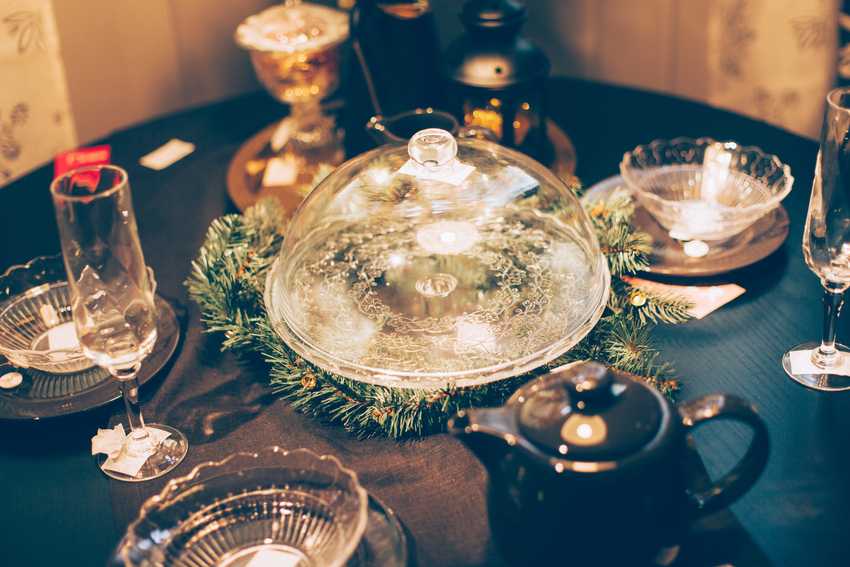
Table of Contents
Seafood
Salmon

Whilst the tinned salmon you find in New Zealand supermarkets is typically wild caught, the fresh or smoked salmon you’ll be serving at Christmas will have been farmed, most likely in New Zealand or Australia. Such farms are at extremely low risk of child or slave labour due to our strong labour laws. However, sadly that doesn’t mean all farmed salmon is slave free. The salmon is fed on an artificial feed that includes both fishmeal and fish oil, both of which are commonly made from fish caught by forced labour. Farmed salmon should only be purchased if the farm ensures their feed has a slave-free supply chain.
Fortunately, one of New Zealand’s largest salmon companies, NZ King Salmon, has committed to only using certified slave-free feed, as has Huon from Australia. You can read more about their commitments here and here. All salmon sold at the fish counter of Countdown supermarkets has been produced by one or other of these companies. You can also buy NZ King Salmon products under their brands Regal and Southern Ocean.
If you buy salmon from the fish counter of a PakNSave or New World supermarket, it will either be produced by NZ King Salmon or Sanford. When we checked with Sanford in 2018, they happened to be buying their feed from a certified slave-free supplier. However, they hadn’t chosen the supplier on that basis and have made no commitments to use a slave-free supplier into the future.
We are hesitant to recommend Sanford into the future. If you’re buying salmon from the fish counter of PakNSave or New World, ask the staff which company is supplying them at the moment. NZ King Salmon is definitely slave free; Sanfords only is if they haven’t changed supplier.
Countdown sells own brand salmon steaks and marinated salmon both pre-packaged and from the fish counter.
Under the Regal brand, New Zealand King Salmon sells cold-smoked salmon slices, hot-smoked salmon steaks, smoked salmon steaks with various flavourings and smoked salmon salsa nibbles.
They also sell budget smoked salmon slices under the Southern Ocean brand.
Prawns

Prawns are complicated. Most prawns are farmed and have a number of risk points when it comes to slavery. Slavery is used in the production of feed for farmed prawns, on prawn farms in many countries and in the processing of prawns. Very few companies that we have contacted have been able to assure us they have a slave-free supply chain. At this stage we can only recommend the following:
For whole prawns (i.e. with their heads and shells intact) any Argentinian red prawns or wild-caught Australian prawns are slave free.
- As of November, Argentinian red prawns are available from the fish counter of PakNSave and New World supermarkets (sometimes they’re labelled ‘red prawns’ or ‘Argentinian red shrimp)‘. Make sure you’re getting the Argentinian ones - they do other species of whole prawns as well, and we aren’t confident the others are slave free. The Argentinian ones are very pink, even uncooked!
- wild-caught Australian prawns are sold under the Ocean Pearl brand in Countdown supermarkets. Any other brand of unprocessed wild-caught Australian prawns will also be fine.
For processed prawns, the only brand we know of that is checking for forced labour throughout its supply chain is Kingfisher. Kingfisher prawns are sold in PakNSave and New World, and their range includes prawn cutlets, crumbed prawns, prawns ready for stir-fry, pre-cooked prawns and marinara mix. We haven’t examined the other elements of the marinara mix in detail, but the thoroughness with which they’ve worked on their prawn supply chain suggests it’s likely any Kingfisher product will be slave free.
Shellfish
Most shellfish is slave-free. Our research has found no evidence of any form of slavery or child labour in the New Zealand shellfish industry, with one sole exception. Farmed paua are fed on fishmeal and oil just like salmon, and so have the same risks of slavery in the production of that feed. None of the New Zealand paua farms that we have contacted have replied to our queries so we cannot recommend any of them. However, most of the paua for sale is wild-caught, so this doesn’t limit your options much.
Scallops
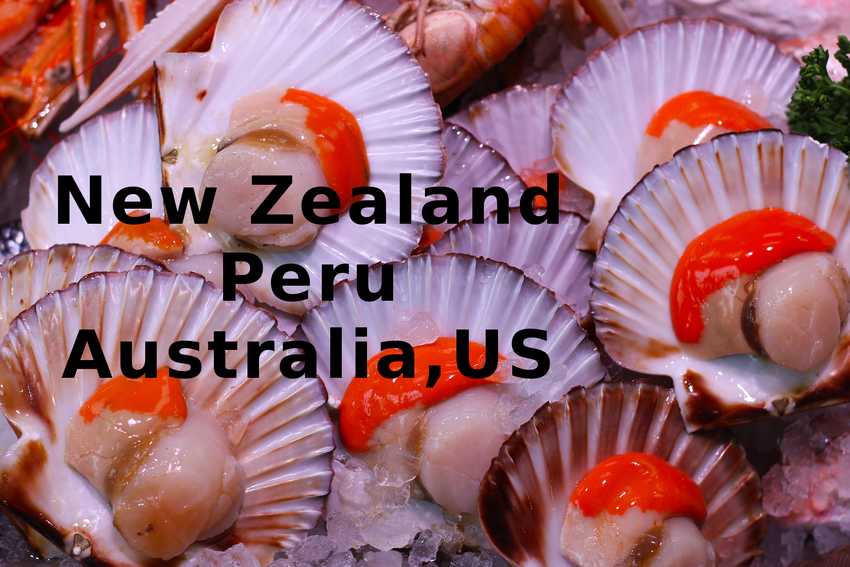
Some of the scallops for sale in New Zealand this Christmas will be wild-caught New Zealand scallops. These will be clearly labelled as such and are definitely slave-free: you can buy them with confidence.
The majority of scallops for sold in New Zealand are imported; most of them come from Peru. We are confident the Peruvian scallop industry is slave-free, although it is not technically free of child labour. 17-year-olds are allowed to work on Peruvian industrial fishing boats, which violates ILO regulations against child labour as this is considered hazardous work. However, we do not consider this a major violation and are happy to recommend Peruvian scallops.
Australian and US scallops are also slave-free; however, all other imported scallops should be avoided. The remaining major supply countries (including Japan and the UK) are all at high risk of slave labour in their scallop industries. We have contacted a number of companies supplying such scallops and none have reported seeking any kind of slave-free assurances from their suppliers.
Suitable scallops are widely available. We’ve seen them at Countdown both by the kg and pre-packaged; at New World by the kg and pre-packaged; and online from Gourmet Seafood. Likely your local fish shop also sells them.
Mussels
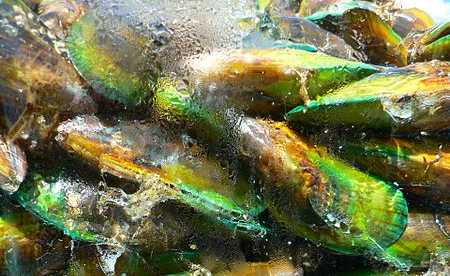
The only mussels likely to be for sale in New Zealand this Christmas are farmed New Zealand green-lipped mussels. These are all slave free and can be purchased with confidence regardless of brand. That goes for mussels in the shell and mussels in all stages of processing.
Oysters

The only oysters likely to be for sale in New Zealand this Christmas are either farmed or wild-caught in New Zealand. These are all slave free and can be purchased with confidence regardless of brand. That goes for oysters in the shell and in all stages of processing.
Clams
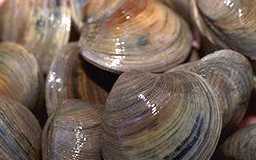
Most clams for sale in New Zealand this Christmas will be wild-harvested from New Zealand. These will all be slave free and can be purchased with confidence. Occasionally you see imported clams; we have not yet investigated clams from any other markets so do not know if they will be slave-free. However, such clams seem always to be clearly marked so are easily avoided.
Ice cream
Ice cream contains a lot of sugar, one of the foods most likely to be produced with slave labour. It also commonly includes cocoa or chocolate: as well as being at risk of slave labour, more than 20% of the world’s cocoa is grown by kids.
To avoid supporting that when you buy ice cream, there is currently only one commercial option in New Zealand: Ben & Jerry’s. The whole Ben & Jerry’s range is Fairtrade certified (meaning not just the sugar and cocoa, but also the coffee, bananas and vanilla they use are Fairtrade), and they’ve got a bunch of other awesome values too!
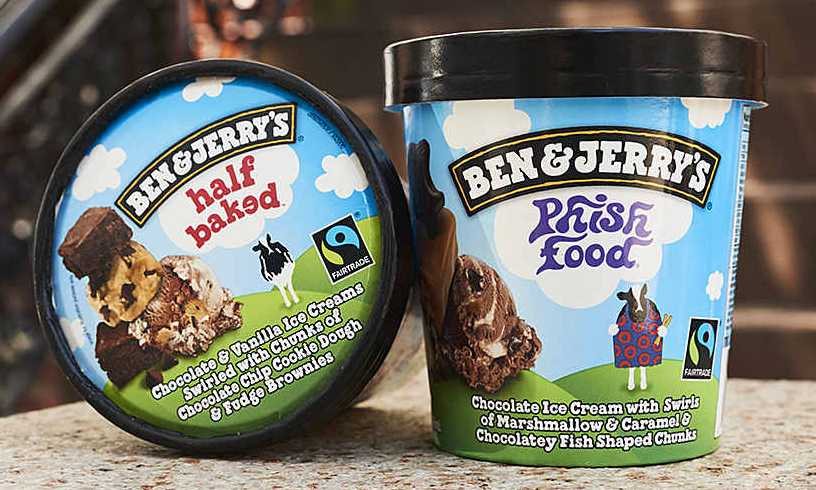
Ben & Jerry’s do 1 pint ice cream tubs in a wide range of flavours, including:
- Chocolate chip cookie dough core
- Chocolate chip cookie dough
- Chocolate fudge brownie
- Half baked
- New York super fudge chunk
- Phish food
- Strawberry cheesecake
- Sweet cream and cookies
- The Tonight Dough
- Triple caramel chunk
they also do Moo-phoria ‘lite’ ice cream in:
- Caramel cookie fix
- Chocolate cookie affair
- P.B. Dough
and Non-dairy ice cream in:
- Chocolate fudge brownie
- Cinnamon buns
- Coconut seven layer bar
- Peanut butter and cookies
Ben & Jerry’s are stocked by Countdown supermarkets, petrol stations and more, as well as at their own scoop shops. You can even buy them through Uber Eats! Look here for your nearest stockist. $12.99/458mL tub.
Soft drinks
As with ice cream, there is currently only one option for soft drinks in New Zealand made with certified slave-free sugar: that’s Karma Cola. All their products are Fairtrade certified. They’re also organic, and they buy their Kola nuts direct from the producers in Sierra Leone and make sure a decent chunk of the profits go back to them.
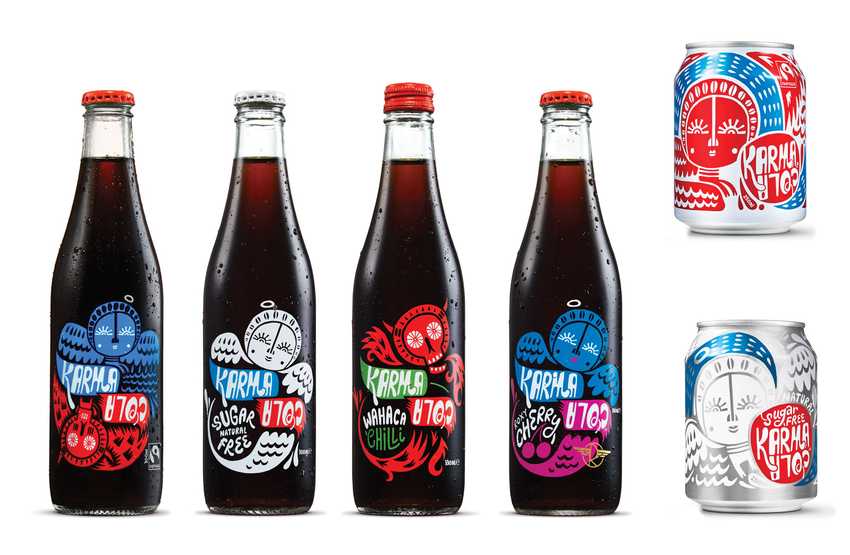
Karma cola soft drinks come in 300mL in the following flavours:
- Karma cola
- Sugar free Karma cola
- Lemmy lemonade
- Gingerella ginger ale
- Summer orangeade
- Lemmy lime and bitters
They also do 330mL bottles of:
- Peach and passionfruit switchel (sugar free and probiotic)
- Apple and blackcurrant swtichel (sugar free and probiotic)
- Lemon and ginger switchel (sugar free and probiotic)
And 250mL cans of:
- Gingerella ginger ale
- Karma cola
- Lemmy lemonade
You can buy boxes of 15 x 300mL bottles ($45), boxes of 12 x 330mL bottles ($44) and trays of 24 cans ($60) direct from their website, or you can buy singles from various health food shops and supermarkets for around $4. See here for your nearest stockist.
Snacks
Savoury snacks and things like nuts or dried fruit are reasonably likely to be free of child and slave labour. However, chocolate and sweets are at risk of having both slavery and child labour in their supply chain. Here are some slave free options to serve.
Chocolate
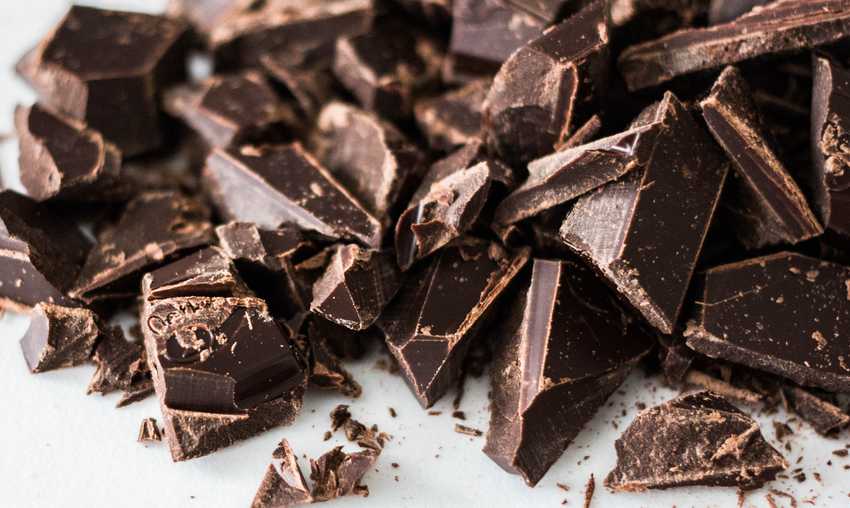
Photo by Charisse Kenion on Unsplash
Our 2019 Christmas gift guide covers a wide range of luxury chocolate products that are free of both child and slave labour. Check it out for chocolate blocks and chocolates with reliable worker welfare certifications.
See our cocoa guide for further options for chocolate blocks. Break them up and serve in a bowl :-)
Sweets

Chocolate sweets with UTZ certification are widely available. Options include:
- Allens’ Freckles and Fantales (around $3.25 for a 120g bag)
- Smarties (around $3.25 for a 120g bag)
- Countdown own brand milk chocolate almonds, sultanas, peanuts, licorice bullets ($2.50 for a 180g bag; licorice is a 270g bag for the same price)
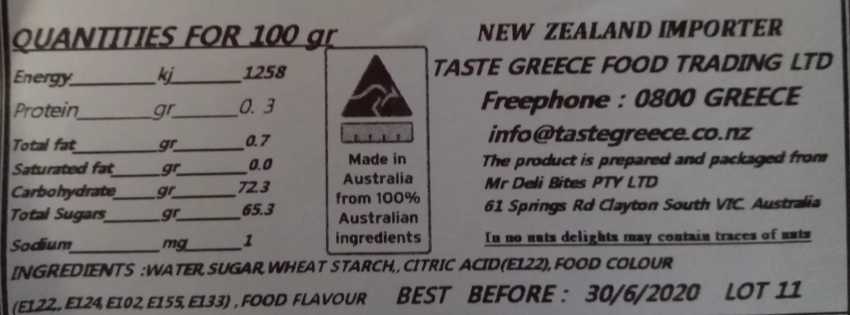
Sugary sweets are harder: no one in New Zealand sells sugary sweets with any slave-free certifications that we are aware of. However, Australian-grown sugar is all slave-free, so any sweets made from 100% Australian ingredients are fine. The same cannot be said for products simply made in Australia: they need to state that the ingredients are from Australia.
The label shown above was on a packet of Turkish Delight from Taste of Greece.
Baking ingredients
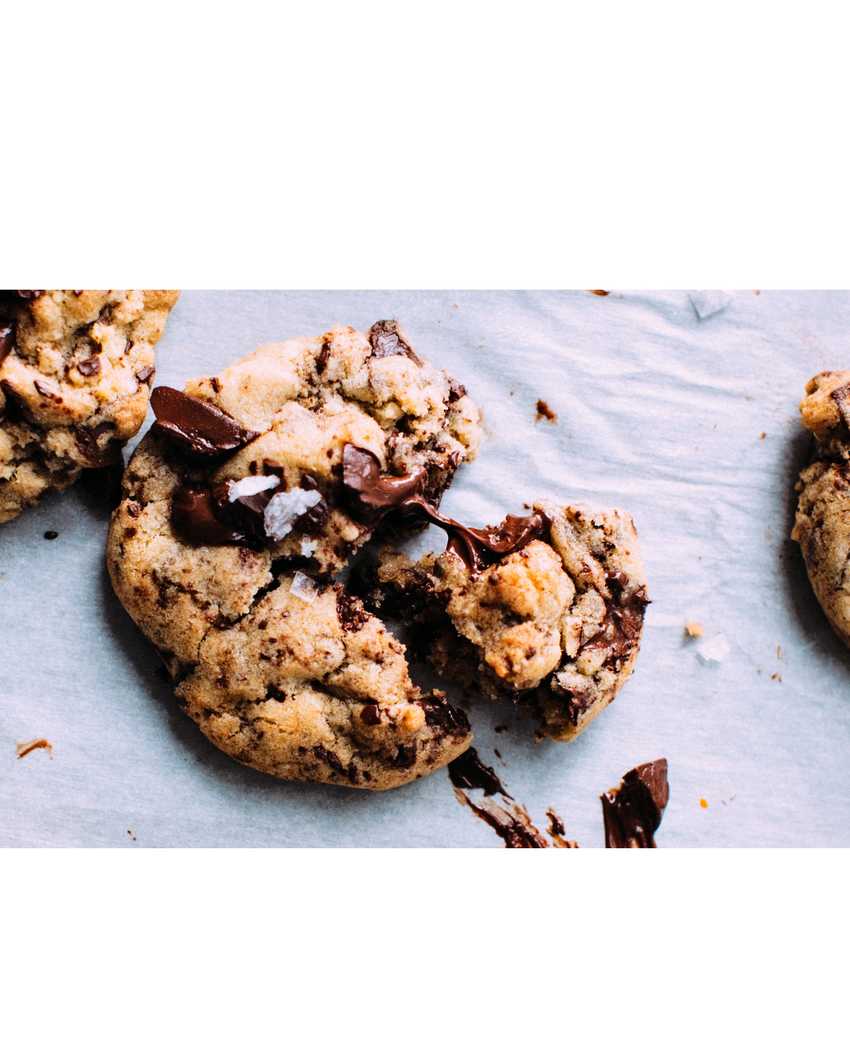
Image credit Jennifer Pallian
Christmas is a great time to bake! Fortunately, cocoa and sugar that are free of child and slave labour are readily available at supermarkets throughout New Zealand. For slave free sugar you’ll need to shop at Countdown, but slave free cocoa and baking chocolate should be available at every supermarket in New Zealand :-)
Sugar

There are three certifications we trust for slave-free sugar: Bonsucro, Fairtrade and WFTO. All three involve thorough audits for child and slave labour on sugar plantations and in sugar mills. However, the latter two are significantly better for the workers. Bonsucro checks for safe working conditions and ensures workers are paid at least the legal minimum wage for their country; in addition the other two make sure the workers are paid enough to live on and provide fair trade premiums that enable communities to do things like build schools, toilets and medical clinics.
Countdown own brand sugar has Bonsucro certification. They do white, brown, icing and caster sugar in bags between 500g and 5kg. It’s cheaper than Chelsea :-)
Trade Aid sells WFTO certified golden granulated sugar in 500g, 1.5kg and 5kg bags ($4.50, $8.49 and $22.99 respectively), as well as 400g bags of muscovado sugar ($4.99). Buy online, from one of their physical stores or from some organic and whole food stores.
Chantal organics makes Fairtrade certified golden sugar in 550g bags. We haven’t managed to find anywhere actually selling it, but if you find it somewhere it’s an excellent choice.
Cocoa

We trust three certifications for cocoa products: UTZ, Fairtrade and WFTO. Structurally these are quite different from each other, but they all guarantee no child labour, no forced labour, a living wage, safe working conditions, maternity leave etc.
- UTZ-certified cocoa is available from Nestle Baker’s Choice (190g tin, around $4) in pretty much any supermarket in the country. If you are concerned about Nestle’s ethics, read up on why we are happy to support them. In addition Countdown own brand cocoa (375g box, around $5) is UTZ certified, as is that from the West Coast Cocoa company (available online, 250g tube, $16).
- Trade Aid sells WFTO-certified cocoa powder in 200g boxes and 2kg bags ($6.99 and $44.50 respectively). Buy online, from one of their physical stores or from some organic and whole food stores.
- Fairtrade certified cocoa powder is available from the Devonport Chocolate Company from their stores in Devonport and Queens Arcade in Auckland or from various stockists. $13 for a 150g tin.
- From correspondence, we have learned that Pam’s superfoods raw cacao powder is also Fairtrade certified, even though they have chosen not to display the certification mark. That’s not ideal, but it’s a good option if you’re after a raw cacao powder. It’s about $5.50 for a 250g bag.
Chocolate chips and baking chocolate

Using the same three certifications mentioned above:
- Dark chocolate chips:
- Countdown essentials, 250g bag for around $2, UTZ certified
- Countdown own brand, 200g for around $2.50, UTZ certified
- Dark chocolate drops:
- Trade Aid, 225g bag for $8.99 or $4.50 for $16.99, WFTO certified
- Nestle Baker’s Choice choc bits, 300g for around $3, UTZ certified
- Countdown own brand, 200g for around $2.50, UTZ certified
- Milk chocolate drops:
- Nestle Baker’s Choice choc bits, 300g for around $3, UTZ certified
- Countdown own brand, 200g for around $2.50, UTZ certified
- White chocolate drops:
- Nestle Baker’s Choice choc bits, 300g for around $3, UTZ certified
- Countdown own brand, 200g for around $2.50, UTZ certified
- Dark baking chocolate:
- Nestle Baker’s Choice dark cooking chocolate, 200g for around $3.50, UTZ certified
- Countdown essentials dark choc cooking block, 375g for around $2.50, UTZ certified
- Milk baking chocolate:
- Countdown essentials milk choc cooking block, 375g for around $2.50, UTZ certified (NB the packaging has changed from what’s shown in that link - it’s now blue and looks like this).
- Chocolate melts:
- Countdown essentials milk chocolate melts, 375g for around $2.50, UTZ certified
- Nestle Baker’s Choice melts, in dark, milk and white chocolate, 290g for around $3, UTZ certified
- Mini smarties for baking:
- Nestle mini smarties, 150g for around $4, UTZ certified.
Other baking ingredients
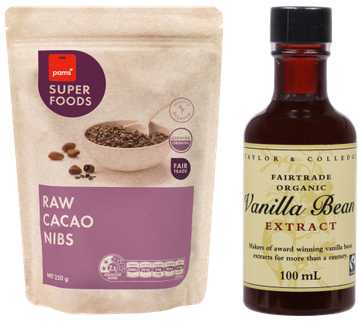
- The cacao nibs and cacao butter in the Pam’s superfoods range are Fairtrade certified, even though they don’t display the Fairtrade logo.
- Some PakNSave and New World supermarkets sell Fairtrade certified vanilla. Vanilla isn’t one of the foods at highest risk of slave labour, but the vanilla industry uses a great deal of child labour. Please consider buying Fairtrade! You’re looking for the 100mL bottle from Taylor and Colledge. Note that none of the rest of that brand is Fairtrade certified, just the 100mL bottle. It sells for around $11.